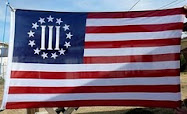 Thanks to our friend Rommellaw for the heads up on this series of posts on Whiskey & Gunpowder
Thanks to our friend Rommellaw for the heads up on this series of posts on Whiskey & GunpowderThis is an exchange between Doug Casey and Louis James about what anarchy is and is not. Anarchy Part II coming soon.
Anarchy Is the Solution to the Evil Idiocy of the State
L: Doug, you keep saying you’re an anarchist. I suspect most of our readers know that doesn’t mean you like to wear black army boots and throw Molotov cocktails at McDonald’s restaurants during WTO protests, but I’m not sure how many really know what it is you do mean. And since this is central to your world-view and hence touches on all your thinking as an investor and speculator, it seems useful to clear the air. Few may agree with us on this topic, but let’s talk about anarchy.
Doug: Sure. If people aren’t open-minded enough to even consider an alternative view, they’re their own worst problem, not my ideas. In point of fact, anarchism is the gentlest of all political systems. It contemplates no institutionalized coercion. It’s the watercourse way, where everything is allowed to rise or fall naturally to its own level. An anarchic system is necessarily one of free-market capitalism. Any services that are needed and wanted by people — like the police or the courts — would be provided by entrepreneurs, who’d do it for a profit.
Look, I’d be happy enough if the state — which is an instrument of pure coercion, even after you tart it up with the trappings of democracy, a constitution, and what-not — were limited to protecting you from coercion and absolutely nothing more. That would imply a police force to protect you from coercion within its bailiwick. A court system to allow you to adjudicate disputes without resorting to force. And some type of military to protect you from outside predators.
Unfortunately, the government today does everything but these functions — and when it does deign to protect, it does so very poorly. The police are increasingly ineffective at protecting you; they seem to specialize in enforcing arbitrary laws. The courts? They apply arbitrary laws, and you need to be wealthy to use them — although you’re likely to be impoverished by the time you get out of them. And the military hardly defends the country anymore — it’s all over the world creating enemies, generally, of the most backward foreigners.
In a free-market anarchy, the police would likely be subsidiaries of insurance companies, and courts would have to compete with each other based on the speed, fairness, and low cost of their decisions. The military presents a more complex problem, beyond our range here.
L: That’s a lot for most mainstream folks to swallow at once, Boss. On the other hand, the way I see it, it would be inconsistent with my libertarian principles to demand that anyone agree with me — but I don’t need to be helping those who would enslave me to make money anyway. That said, let’s try to ease into this…
Doug: So, let’s start with a definition. Many people think of anarchy as being chaos. They see riots and chaos on TV from some place in conflict and think, “What anarchy!”
L: That’s if the talking heads don’t tell them that what they are seeing is anarchy to begin with.
Doug: Right. But chaos and bomb throwing are not anarchy. Chaos is the actual opposite of anarchy. Anarchy is simply a form of political organization that does not put one ruler, or ruling body, over everyone in a society. Whether that’s actually possible is a separate matter. This is what it means. And I see it as an ideal to strive for.
L: I’m looking at Webster’s, and it says that anarchy is: A: Absence of government. B: A state of lawlessness or political disorder due to the absence of governmental authority. C: A utopian society of individuals who enjoy complete freedom without government. People might say you’re focusing only on C.
Doug: Look at the etymology. It comes from the Greek anarchos, meaning “having no ruler,” an-, not, and archos, ruler. Definition B has come into popular use, but that doesn’t make it right.
“Anarchy” is a word that’s been stolen and corrupted by the collectivists — like “liberal,” It used to be that a liberal was someone who believed in both social and economic freedom. Now a liberal is no better than a muddle-headed thief — someone who’s liberal only with other people’s money.
I refuse to let the bad guys control the intellectual battlefield by expropriating and ruining good words.
In any event, there’s no conflict whatsoever between anarchy and the rule of law, since there are private forms of law and governance. That’s what Common Law is all about. So the correct definition is a combination of A and C.
But I never said a truly free, anarchic society would be a utopia; it would simply be a society that emphasizes personal responsibility and doesn’t have any organized institutions of coercion. Perfect harmony is not an option for imperfect human beings. Social order, however, is possible without the state. In fact, the state is so dangerous because it necessarily draws the sociopaths — who like coercion — to itself.
What holds society together is not a bunch of strict laws and a brutal police force — it’s basically peer pressure, moral suasion, and social opprobrium. Look at a restaurant. The bills get paid not because anybody is afraid of the police, but for the three reasons I just mentioned.
THE DISCUSSION CONTINUES HEREDoug Casey and Louis James
Whiskey & Gunpowder
























